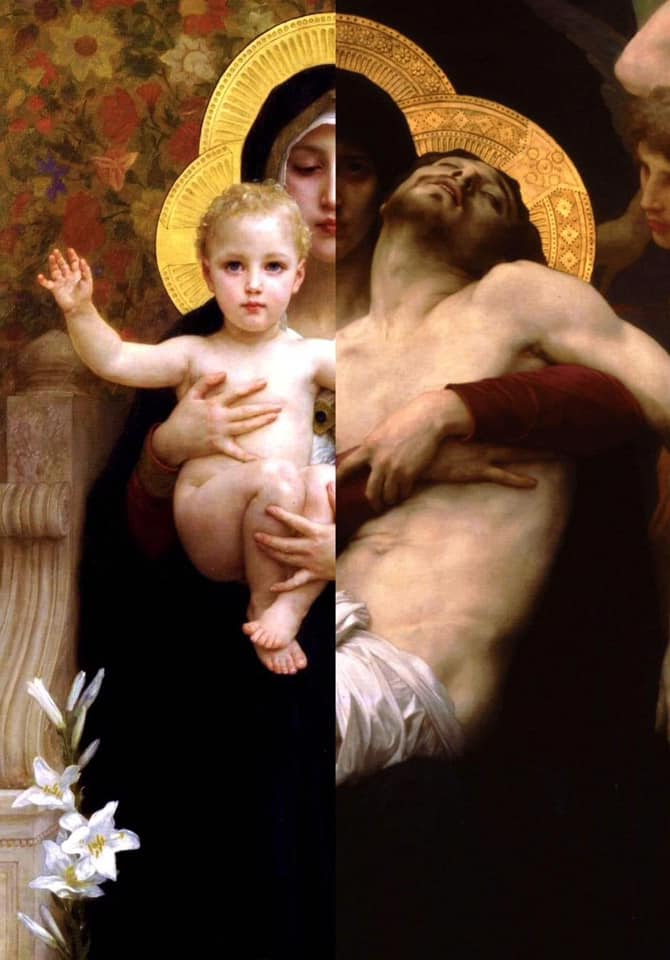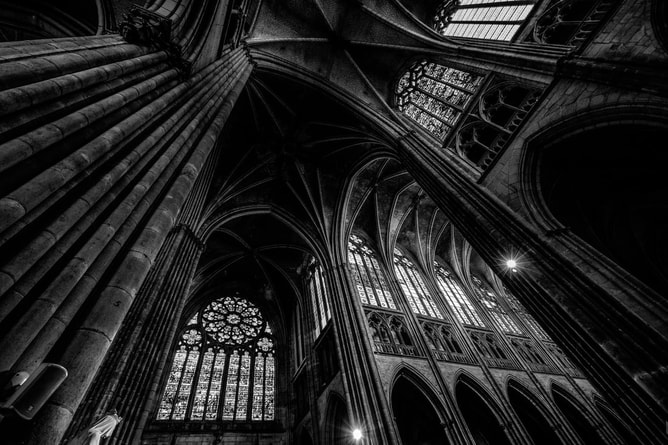Reflections on Sacred Music...
“Music has the power to lead us back…to the Creator of all harmony, creating a resonance within us which is like being in tune with the beauty and truth of God, with the reality which no human knowledge or philosophy can ever express.”
― Pope Benedict XVI, 2007
“The Church acknowledges Gregorian chant as specially suited to the Roman liturgy: therefore, other things being equal, it should be given pride of place in liturgical services. But other kinds of sacred music, especially polyphony, are by no means excluded from liturgical celebrations, so long as they accord with the spirit of the liturgical action.”
― Pope Paul VI, Sacrosanctum Concilium (1963)
“Gregorian Chant has always been regarded as the supreme model for sacred music, so that it is fully legitimate to lay down the following rule: the more closely a composition for church approaches in its movement, inspiration and savor the Gregorian form, the more sacred and liturgical it becomes; and the more out of harmony it is with that supreme model, the less worthy it is of the temple.”
― Pope St. Pius X "Tra le sollecitudini" (1903)
"Begin with the beautiful, which leads you to the good, which leads you to the truth." ― Bishop Robert Barron (2011)
"Active participation does not preclude the active passivity of silence, stillness and listening: indeed, it demands it. Worshippers are not passive, for instance, when listening to the readings or the homily, or following the prayers of the celebrant, and the chants and music of the liturgy. These are experiences of silence and stillness, but they are in their own way profoundly active. In a culture which neither favors nor fosters meditative quiet, the art of interior listening is learned only with difficulty. Here we see how the liturgy, though it must always be properly inculturated, must also be countercultural.” ― Saint Pope John Paul II (1998)
― Pope Benedict XVI, 2007
“The Church acknowledges Gregorian chant as specially suited to the Roman liturgy: therefore, other things being equal, it should be given pride of place in liturgical services. But other kinds of sacred music, especially polyphony, are by no means excluded from liturgical celebrations, so long as they accord with the spirit of the liturgical action.”
― Pope Paul VI, Sacrosanctum Concilium (1963)
“Gregorian Chant has always been regarded as the supreme model for sacred music, so that it is fully legitimate to lay down the following rule: the more closely a composition for church approaches in its movement, inspiration and savor the Gregorian form, the more sacred and liturgical it becomes; and the more out of harmony it is with that supreme model, the less worthy it is of the temple.”
― Pope St. Pius X "Tra le sollecitudini" (1903)
"Begin with the beautiful, which leads you to the good, which leads you to the truth." ― Bishop Robert Barron (2011)
"Active participation does not preclude the active passivity of silence, stillness and listening: indeed, it demands it. Worshippers are not passive, for instance, when listening to the readings or the homily, or following the prayers of the celebrant, and the chants and music of the liturgy. These are experiences of silence and stillness, but they are in their own way profoundly active. In a culture which neither favors nor fosters meditative quiet, the art of interior listening is learned only with difficulty. Here we see how the liturgy, though it must always be properly inculturated, must also be countercultural.” ― Saint Pope John Paul II (1998)
“The pipe organ is to be held in high esteem in the Latin Church, for it is the traditional musical instrument, the sound of which can add a wonderful splendour to the Church’s ceremonies and powerfully lifts up people’s minds to God and to higher things.” ― Second Vatican Council, Sacrosanctum Concilium #120, December 4th, 1963
"In an organ, the many pipes and voices must form a unity. If here or there something becomes blocked, if one pipe is out of tune, this may at first be perceptible only to a trained ear. But if more pipes are out of tune, dissonance ensues and the result is unbearable. Also, the pipes of this organ are exposed to variations of temperature and subject to wear. Now, this is an image of our community in the Church. Just as in an organ an expert hand must constantly bring disharmony back to consonance, so we in the Church, in the variety of our gifts and charisms, always need to find anew, through our communion in faith, harmony in the praise of God and in fraternal love." ― Pope Benedict XVI
"In an organ, the many pipes and voices must form a unity. If here or there something becomes blocked, if one pipe is out of tune, this may at first be perceptible only to a trained ear. But if more pipes are out of tune, dissonance ensues and the result is unbearable. Also, the pipes of this organ are exposed to variations of temperature and subject to wear. Now, this is an image of our community in the Church. Just as in an organ an expert hand must constantly bring disharmony back to consonance, so we in the Church, in the variety of our gifts and charisms, always need to find anew, through our communion in faith, harmony in the praise of God and in fraternal love." ― Pope Benedict XVI
"The musical tradition of the universal Church is a treasure of inestimable value, greater even than that of any other art. The main reason for this pre-eminence is that, as a combination of sacred music and words, it forms a necessary or integral part of solemn liturgy" ― Second Vatican Council, Sacrosanctum Concilium #112 December 4th, 1963
“The Church esteems the service (choir) that you present in the community: you help it to feel the attraction of the beautiful, which detoxifies us from mediocrity, lifts us higher, toward God, and unites hearts in praise and in tenderness.” ― Pope Francis (2019)
“These qualities [sacredness, beauty, universality] are to be found, in the highest degree, in Gregorian Chant, which is, consequently, the Chant proper to the Roman Church, the only chant she has inherited from the ancient fathers, which she has jealously guarded for centuries in her liturgical codices, which she directly proposes to the faithful as her own, which she prescribes exclusively for some parts of the liturgy, and which the most recent studies have so happily restored to their integrity and purity.” ― Pope St. Pius X "Tra le sollecitudini" (1903)
“The power of sacred music increases the honor given to God by the Church in union with Christ, its Head. Sacred music likewise helps to increase the fruits which the faithful, moved by the sacred harmonies, derive from the holy liturgy. These fruits, as daily experience and many ancient and modern literary sources show, manifest themselves in a life and conduct worthy of a Christian.” ― Pope Pius XII “Musicae Sacrae” (1955)
“The Church esteems the service (choir) that you present in the community: you help it to feel the attraction of the beautiful, which detoxifies us from mediocrity, lifts us higher, toward God, and unites hearts in praise and in tenderness.” ― Pope Francis (2019)
“These qualities [sacredness, beauty, universality] are to be found, in the highest degree, in Gregorian Chant, which is, consequently, the Chant proper to the Roman Church, the only chant she has inherited from the ancient fathers, which she has jealously guarded for centuries in her liturgical codices, which she directly proposes to the faithful as her own, which she prescribes exclusively for some parts of the liturgy, and which the most recent studies have so happily restored to their integrity and purity.” ― Pope St. Pius X "Tra le sollecitudini" (1903)
“The power of sacred music increases the honor given to God by the Church in union with Christ, its Head. Sacred music likewise helps to increase the fruits which the faithful, moved by the sacred harmonies, derive from the holy liturgy. These fruits, as daily experience and many ancient and modern literary sources show, manifest themselves in a life and conduct worthy of a Christian.” ― Pope Pius XII “Musicae Sacrae” (1955)
"The organ has always been considered, and rightly so, the king of musical instruments, because it takes up all the sounds of creation and gives resonance to the fullness of human sentiments, from joy to sadness, from praise to lamentation. By transcending the merely human sphere, as all music of quality does, it evokes the divine. The organ’s great range of timbre, from piano through to a thundering fortissimo, makes it an instrument superior to all others. It is capable of echoing and expressing all the experiences of human life. The manifold possibilities of the organ in some way remind us of the immensity and the magnificence of God." -Pope Benedict XVI (2006)

